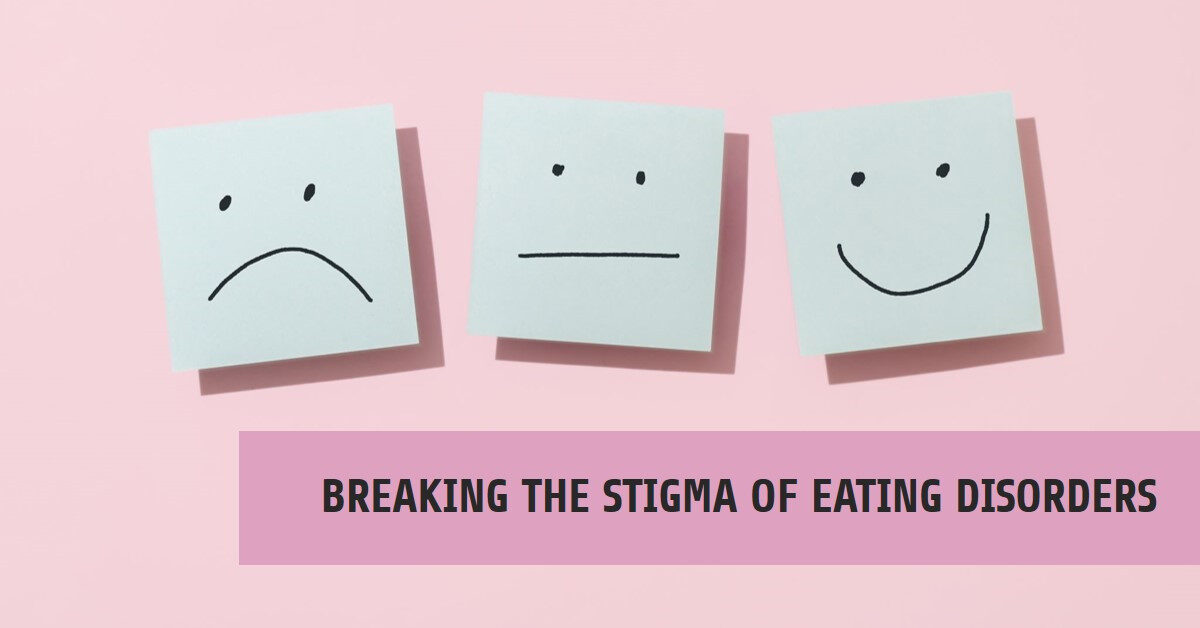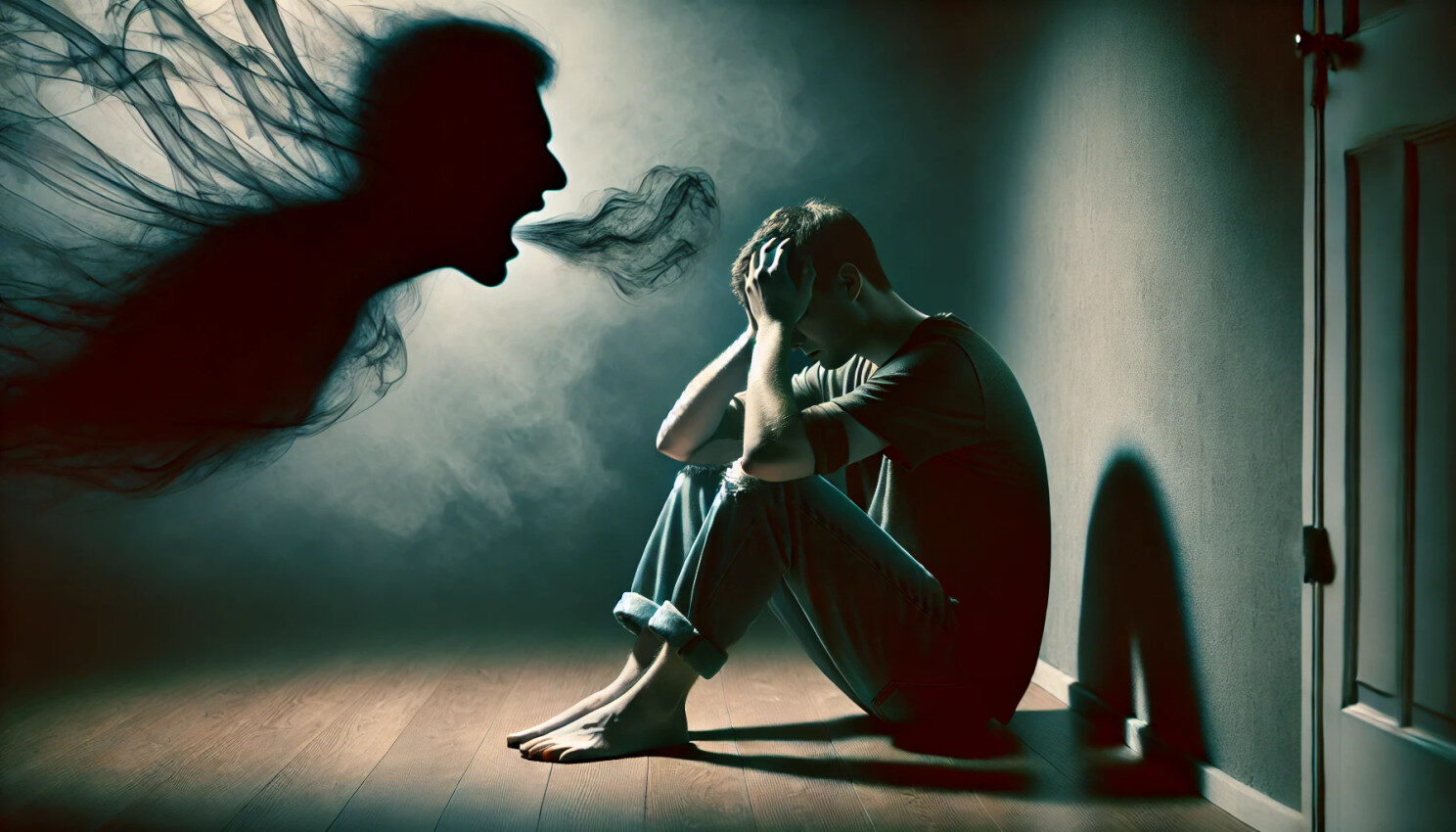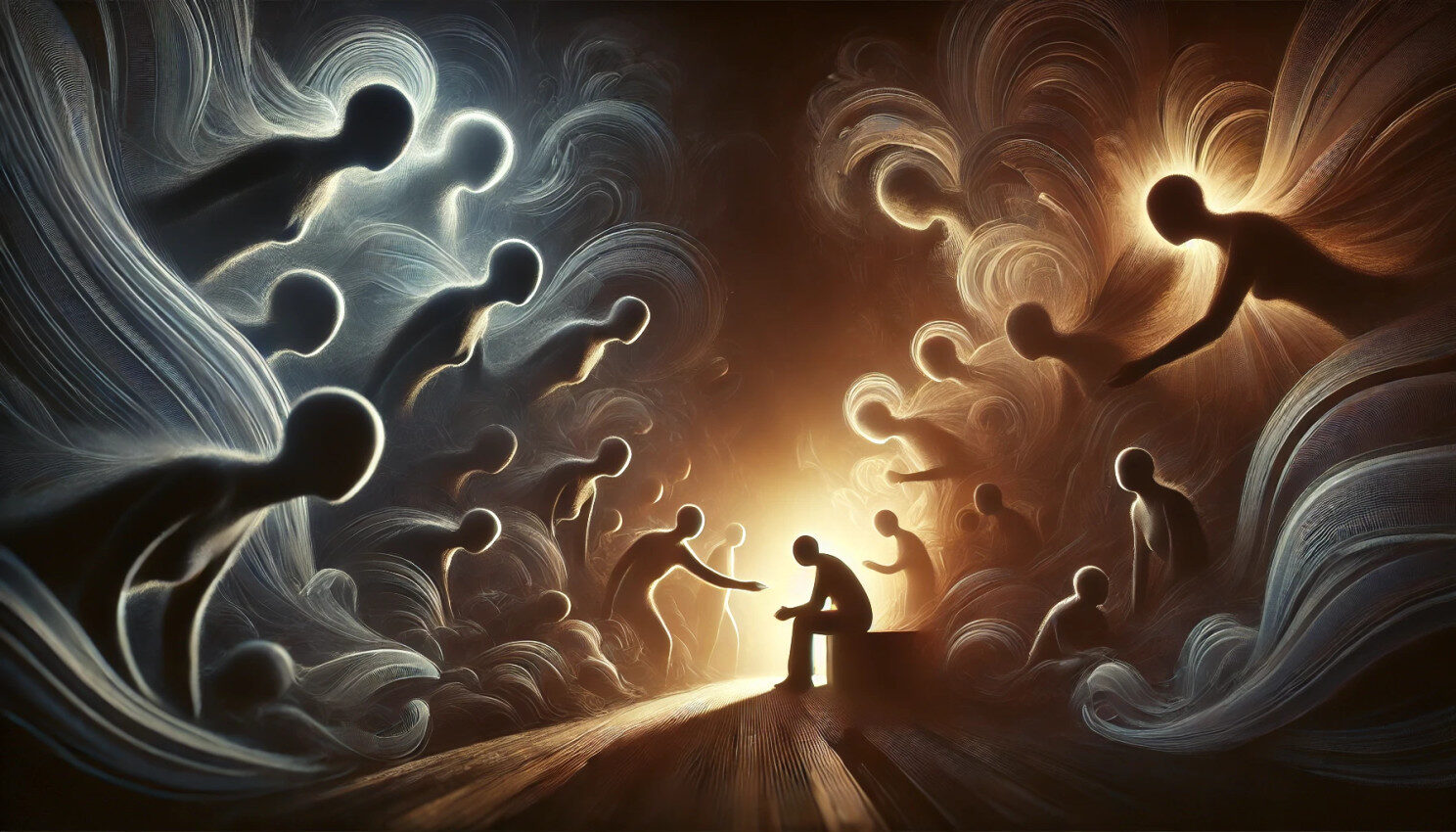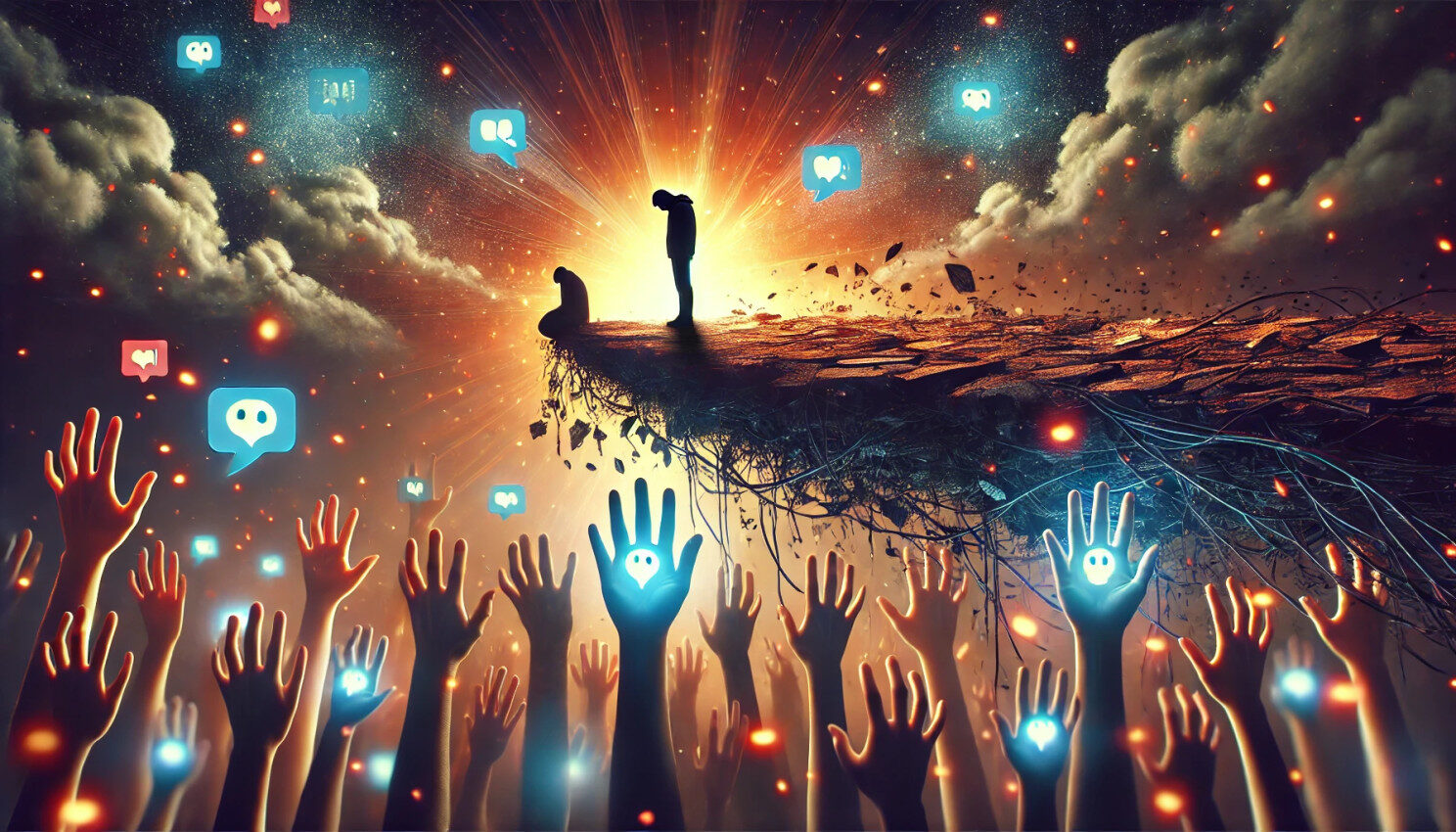

Eating disorders. The words alone often conjure images of extreme thinness, counting calories, or obsessing over exercise; those images barely scratch the surface. The reality is far more complex, far more painful, and tragically misunderstood.
Beneath the outward behaviours lies an invisible war – a relentless battle that rages in silence. For many people, eating disorders are not about vanity or willpower but about control, trauma, and emotions too overwhelming to express; both deeply personal and profoundly isolating, stealing lives while hiding in plain sight.


You might not notice it, but they are drowning under the weight of an invisible struggle.
In the UK alone, eating disorders impact over 1.25 million people, spanning all ages, genders, and walks of life. Yet despite these staggering numbers, eating disorders remain shrouded in stigma, judgment, and harmful social stereotypes. Words like “attention-seeking” or “just eat something” do far more harm than good, pushing those affected deeper into their silent suffering.
As Mental Health First Aiders, as professionals, as human beings, it is time we unmask this hidden struggle. It is time we open our eyes, our minds, and our hearts. Eating disorders are not simply about food; they are about survival. They are a reflection of pain so raw that the body becomes the battlefield.
In this post I will explore the realities of eating disorders: what they are, why they happen, and how we can support those affected. It will challenge misconceptions, break down barriers to compassion, and empower readers to recognise the signs, because early intervention, understanding, and human connection save lives.
The invisible battle deserves to be seen. The hidden struggle deserves to be heard. And for those who are fighting: you are not alone.
For many, the term “eating disorders” conjures images of emaciated bodies or obsessive calorie counting. These terms barely scratch the surface of an illness that is complex, consuming, and life-altering. Eating disorders are not about food, they are about survival. They are a language of pain, a response to chaos, and a silent scream that often goes unheard.
Do you have children? Yes? Imagine you notice your child skipping meals, claiming they’re “just not hungry,” or obsessing over their appearance. At first, it might seem like a phase, but as weeks turn into months, their mood darkens, their body weakens, and their joy seems to disappear. Or imagine being a team leader watching a once-vibrant employee withdraw from team lunches, spending long hours at the gym, and becoming visibly frail. You ask yourself, What is happening? The answer lies beneath the surface, hidden in the shadows of an eating disorder.

At their core, eating disorders are mental health conditions with devastating physical consequences. They are not choices, phases, or acts of rebellion. They are illnesses born from a complex interplay of emotional pain, society pressure, genetics, and trauma.

For someone with an eating disorder, food is not nourishment, it is a battleground. Every bite, every thought about eating, is a war between survival and control, shame and need, fear and longing. These disorders twist reality, making the very act of eating feel like failure and the emptiness of hunger feel like triumph.
Understanding eating disorders means recognising their different forms and the unique ways they manifest. These are not categories but experiences, each as devastating as the next:
Anorexia is perhaps the most well-known eating disorder, but its complexities are often misunderstood. It is not simply about refusing to eat; it is about using starvation as a means to feel in control. For someone with anorexia, the hunger that gnaws at their stomach becomes a twisted source of power. The body shrinks, but so does their world; friendships, family, joy, and purpose all fade away. They may obsessively weigh themselves, measure portions, and push their body past its limits, all while insisting they are “fine.”
Consider this: A 16-year-old girl who is the star of her school’s dance team begins skipping meals to “stay light.” At first, it’s applauded as dedication, but soon her energy wanes, her mood sours, and she collapses during practice. Her eating disorder has taken more than her health – it’s stolen her dreams.
Bulimia is a cycle of binge eating followed by purging; vomiting, excessive exercise, or laxative misuse to rid the body of the perceived “guilt” of eating. It is an exhausting pattern driven by shame and self-loathing. Outwardly, a person with bulimia may seem “normal” or even healthy, but internally, they are trapped in a punishing cycle that leaves them physically and emotionally drained.
Consider this: A 28-year-old professional consultant who feels constant pressure to excel at work secretly binges on takeaway meals in his car, then spends hours at the gym to “make up for it.” Colleagues praise his discipline, unaware of the torment beneath the polished exterior.
Binge eating disorder is marked by consuming large quantities of food in a short period, often in secret. Unlike bulimia, there are no compensatory behaviours, which leads to feelings of shame, guilt, and loss of control. For many, food becomes both a comfort and a punishment, a way to cope with emotions that feel too big to face.
ARFID is not about weight or body image but an extreme avoidance of certain foods, often due to sensory sensitivities, fear of choking, or past trauma. This disorder can lead to severe nutritional deficiencies and social isolation, as eating becomes an overwhelming source of anxiety.
ARFID Example: A 10-year-old boy who refuses to eat anything but plain bread and applesauce. His parents struggle to understand why he panics at the sight of new foods, not realising his aversion is a disorder, not stubbornness.
OSFED encompasses disordered eating behaviours that do not fit neatly into one diagnosis but are no less harmful. This category reminds us that eating disorders are not “one size fits all” – they are deeply personal and profoundly destructive.
Eating disorders are unique in how they straddle both mental and physical health. The body bears the brunt, rapid weight loss, fatigue, malnutrition, organ damage, but the mind endures an equally relentless assault. Thoughts become consumed by food, calories, rituals, and shame.


A person battling an eating disorder often feels trapped in their own mind. Imagine your voice relentlessly whispering:
“You are not enough.”
“Do not eat that, you do not deserve it.”
“They will judge you if you gain weight.”
It is a voice that drowns out logic, compassion, and joy. It demands control, punishes imperfections, and isolates the person further. It turns the simple act of nourishment into an emotional battleground, where every bite feels like failure and affects individuals in personal ways:
Eating disorders are surrounded by harmful myths that influences stigma and prevents individuals suffering from seeking help:
“Only teenage girls get eating disorders.”
“You can tell someone has an eating disorder by looking at them.”
“They are just attention-seeking.”
“It’s just about food.”
These myths cause harm. They isolate those who are struggling, silence their pleas for help, and deepen the shame that already feels unbearable.
Eating disorders are not defined by their labels alone. They are experiences that consume every aspect of a person’s life:

To truly understand eating disorders, we must move beyond stereotypes and simplistic explanations. These illnesses are not about vanity or lack of willpower. They are about pain, control, and survival. For those struggling, the battle is all-consuming; a fight for their very existence.

As parents, friends, colleagues, and Mental Health First Aiders, it is our responsibility to see beyond the surface. To recognise that eating disorders are not choices but cries for help. To understand that behind every behaviour is a person in pain, longing to be seen, heard, and supported.
Will you take the time to listen? Will you see the unseen? Understanding is the first step toward saving a life.
Fact: Eating disorders do not emerge overnight.

They are not phases, fads, or cries for attention. They are storms that build over time; silent, powerful, and devastating; until they consume everything. To understand eating disorders, we must look beyond behaviours and symptoms to see the tangled roots beneath. The why is never simple, never singular. It is a web of trauma, control, perfectionism, and pain, each thread pulling tighter until breaking free feels impossible.

Consider This: A parent may not notice or understand why their once-vibrant and energetic child now hides food or skips meals, or a leader is confused by the sudden change in a team member’s energy and focus, the why may feel incomprehensible. To dismiss these struggles as shallow or superficial is to ignore a life in turmoil, a cry for help.
When life spirals out of control, eating disorders offer a deceptive refuge. They promise stability when everything else feels unpredictable. For someone who feels powerless, food becomes the one thing they can dictate:
For those trapped in chaos – divorce, grief, bullying, or work stress – control over food becomes a coping mechanism, an anchor in storm driven seas.

 A teenager silently torn apart by their parents’ divorce begins restricting meals. In a home full of arguments and uncertainty, hunger becomes their secret form of power. With every skipped bite, they think, “This, I can control.”
A teenager silently torn apart by their parents’ divorce begins restricting meals. In a home full of arguments and uncertainty, hunger becomes their secret form of power. With every skipped bite, they think, “This, I can control.”What starts as a solution quickly becomes captivity.
The illusion of control fuels the obsession, creating rules so rigid they consume every waking moment. It is no longer about life; it is about survival on their own destructive terms.
Consider This: A 16-year-old girl sits in her school cafeteria, unnoticed, unheard. At home, her parents are too busy arguing to see her pain. At school, teachers are too distracted to notice her fading presence. She begins skipping meals. Each hunger pang feels like achievement, one area where she is winning. What begins as a need for control spirals into a daily obsession, her body shrinking as her desperation grows.
When control is all-consuming, freedom feels terrifying.
Perfectionism is often praised as hard work, as dedication, as success. But for those battling eating disorders, perfectionism becomes a prison.


The voice of the inner critic is constant and merciless:
“You are not good enough.”“You must try harder.”
“If you fail, you are worthless.”
This unrelenting pressure fuels disordered eating behaviours. The need to excel in academics, in careers, in appearance, leaves no room for imperfection. Food, exercise, and weight become measurable targets, ways to prove their worth.
Perfection is an unattainable illusion. The closer you get, the further away it feels. Each meal skipped, each pound lost, brings a hollow victory, and a crushing sense of failure when they fall short.
For those carrying trauma, eating disorders become a way to cope; to numb the pain, to suppress the memories, to regain power over what was once stolen. Abuse, neglect, grief, or sudden loss leave wounds so deep they seem impossible to heal. The body becomes both a battleground and a shield.
Trauma leaves behind a voice that screams:
“You are broken.”
“You are worthless.”
“You do not deserve peace.”
Before the body begins to show the toll, eating disorders wreak havoc on the mind. The emotional and psychological symptoms are often the first clues if we know where to look:
For some, food, whether restriction, bingeing, or purging, feels like the only way to silence that voice, even if just for a moment.
From childhood, we are bombarded with messages that thin is beautiful, that dieting is normal, that bodies must be perfected to be worthy.


“You look great – have you lost weight?”
For those already vulnerable, these messages are toxic fuel. The desire to fit in, to be good enough, or to disappear entirely drives behaviours that spiral out of control.
While eating disorders often begin invisibly, the body eventually begins to show signs of distress. The physical symptoms vary depending on the disorder, but the damage is always real, always dangerous.
Eating disorders are illnesses. They are not choices or failures; they are influenced by genetics, brain chemistry, and mental health.
Eating disorders are deceptive.
They hide behind smiles, excuses, and busy lives. Society’s obsession with dieting and weight loss normalises behaviours that should raise red flags:
By the time the signs are clear, the disorder’s grip may already be deadly. This is why awareness matters; every skipped meal, every purge, every cry for help ignored is another step deeper into the illness.
To help, we must ask: What pain lies beneath? What chaos are they trying to control? It is to ask the hard questions:
“I have noticed you are not eating much lately – are you okay?”
“You seem tired and withdrawn. Is something going on?”
Understanding the why allows us to respond not with judgment but with compassion, patience, and hope.
To understand is to offer the first step toward healing.
The truth is harsh: eating disorders have the highest mortality rate of all mental health conditions, yet their impact is rarely understood. Beyond the physical suffering lies a profound emotional toll, not only for the person struggling but for everyone who loves them. Parents, friends, siblings, partners, and colleagues; no one escapes unscathed.
Understanding this impact is essential because the destruction caused by eating disorders is not always visible until it is too late.
The human body can endure incredible hardship, but eating disorders push it to its breaking point. Starvation, purging, and bingeing are not just harmful, they are catastrophic, dismantling the body system by system:
For the person struggling, these symptoms often feel like deserved punishments; a reflection of their perceived failures. But to the outside world, the signs may appear too late, leaving families reeling with grief and guilt, asking themselves:
“Why didn’t we see it sooner?”
Eating disorders imprison the mind. They whisper relentless lies, drowning out reality with shame, fear, and self-loathing. The emotional and psychological consequences are as deadly as the physical damage:
The psychological toll is invisible but suffocating. It steals joy, purpose, and hope.
Eating disorders fracture the very relationships meant to sustain us. Families, friendships, and partnerships strain under the weight of fear, frustration, and misunderstanding.
Eating disorders do not just steal health; they steal potential. Careers, education, and aspirations are placed on hold as the illness takes over:
For families and friends who lose someone to an eating disorder, the grief is indescribable. It is a grief filled with unanswered questions and haunting regrets:
“Did I miss the signs?”
“Could I have done more?”
“Why did this happen to someone I love?”
Eating disorders are not phases. They are not choices. They are deadly illnesses that devastate lives and leave behind wounds that never fully heal.

Eating disorders are not just illnesses, they are isolating prisons built on silence and shame. They thrive in darkness, convincing those struggling that no one will understand, that no one will care. The weight of stigma keeps eating disorders hidden, while the absence of visible support leaves many feeling there is no way out.

To break this cycle, we must confront stigma with unrelenting compassion, create environments of safety, and ensure that support systems are strong enough to catch those who are falling. Recovery is never simple, and it is never short, but it becomes possible when someone feels heard, understood, and supported.
For someone battling an eating disorder, stigma is not just a societal problem; it is a barrier to survival. The fear of judgment keeps people quiet, even as they feel their world falling apart.
Harmful myths about eating disorders perpetuate stigma, forcing people to suffer in silence:
Mental Health First Aiders (MHFA) play a pivotal role in breaking the silence and connecting individuals with the help they need. They are not therapists, but they are trained to listen, recognise the signs, and offer guidance with empathy and discretion.
MHFAs are often the first to spot the subtle, early signs of an eating disorder. These might include:
By paying attention to these behaviours, MHFAs can gently open the door to conversation.
One of the most powerful things an MHFA can offer is a safe, nonjudgmental space. This means:
For someone battling an eating disorder, feeling seen and heard can be the difference between despair and hope.
Recovery is not a solitary journey. It takes a strong, compassionate support system to help someone rebuild their life. Families, friends, colleagues, and professionals all play vital roles in this process.
Families and friends often feel helpless, unsure how to support their loved one without causing harm. Education and open communication are key:
Eating disorders require professional intervention. Therapists, dietitians, and medical practitioners work together to address both the psychological and physical aspects of the illness. Key resources include:
For those ready to take the first step, accessible resources can provide guidance and hope:
Every act of support; no matter how small; can help someone take a step toward recovery. By breaking the stigma and showing compassion, you become a lifeline for someone who may feel lost and alone.
 To the parent watching their child struggle: Be patient. Show love. Let them know they are not alone.
To the parent watching their child struggle: Be patient. Show love. Let them know they are not alone.
Recovery is not just about surviving – it is about reclaiming life.
Eating disorders are not faceless statistics. They are real. They are raw. They are the silent battles fought by someone you may know; someone you care about. Behind every skipped meal, every purged regret, every binge eaten in the shadows, there is a person crying out for help, a person longing to feel seen, heard, and understood.
Eating disorders steal lives; physically, emotionally, spiritually, and yet, they remain shrouded in mystery. The world generally looks away, calling them an individuals choice, phase, or superficial struggle. However, you cannot ignore what you now know. You have seen the devastation. You have felt the urgency. With that knowledge comes a responsibility: to act.
As you reflect on this post, let these truths stay with you:
The fight against eating disorders begins with you
You do not need to be a doctor or a therapist to make a difference. You just need to care; to show up when someone feels invisible, to listen when their voice is shaking, and to speak up when silence feels easier.

For those who are struggling: You are not alone. Your worth is not defined by your weight, your meals, or your illness. The voice that tells you otherwise is lying to you. Recovery is hard, but it is possible.
For those who care for someone struggling: You are not helpless. Your compassion, your understanding, and your willingness to take action can change everything. Even if you do not have all the answers, your presence matters. Your love matters.
Eating disorders do not have to win. With awareness, understanding, and action, we can dismantle the stigma, recognise the signs, and build pathways to recovery. But it begins with everyone; with you.
Will you see the unseen?
Will you hear the unspoken?
Will you step forward when someone needs you most?
Behind every eating disorder is a person waiting for someone to notice, someone to listen, someone to care.
Be that person. Save a life. The future is now.

Microsoft Solution Architect, Senior Project Manager, and Mental Health Advocate